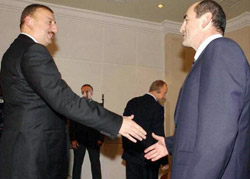The Armenian authorities are not the only ones that predict that 2006 will be a year for resolving the Karabagh conflict. International officials have also made announcements and they claim that both sides are on their way to come to terms. There are many predictions that the conflict will be resolved in 2006.
Many people believe that during the Robert Kocharyan-Aliev meeting on February 10 in Paris, both sides will sign the “Main Principles Document” which will be put up for discussion by the West.
Leader of the “Republican” group of the National Assembly Galust Sahakyan doesn’t believe that the presidents will sign anything during the meeting to take place on February 10.
“In reality, they are discussing the allocation of the peacekeeping forces. The people of Armenia and Azerbaijan are making up the rest of the announcements and those announcements continue to be made by the political forces. There are some people that show the society that they know many things when they really don’t and take advantage of the people,” said G. Sahakyan.
According to president of Armenia’s Union of Politicians and National Assembly MP Hmayak Hovhannisyan, it’s not right to predict anything days before the meeting-predicting whether or not 2006 will be year for conflicts. The politician and the MP doesn’t believe that the Karabagh conflict will “be included in the agenda” knowing what each side is capable of and their orientation.
“Although the co-chairmen of the Minsk group hope that 2006 will be a year for conflicts, however, the Armenian and Azeri sides differ in opinion. Azerbaijan expects and demands too much. If the Azeri side thinks that the Armenian side will base its orientation only on the Karabagh peace settlement (which doesn’t mean that both sides will come to terms), then it means that we can predict that in this stage, both sides will get a clear picture of the reality and they will be more tolerant towards one another. But a final solution will not be made,” said H. Hovhannisyan.
Secretary of the National Assembly’s “Justice” alliance Victor Dallakyan doesn’t think that the Karabagh conflict will be resolved during the Kocharyan-Aliev meeting in February. He has serious analyses about this.
“The former and current chairmen of the OSCE have announced that 2006 will be a decisive year for the Karabagh peace settlement. This means that the world thinks this way. Besides that, Vartan Oskanyan announced that there is a one page document stating the principles which he has set with Mamedyarov. In other words, there is a document for principles. The number of pages is not important. For example, one of the principles can be the following: Karabagh can not be a part of Azerbaijan. But since there is a document which, according to Oskanyan, may become a very important document and the only thing left is detailing, then that proves to me that the conflict will be resolved in 2006. People have just made some announcements, but they are serious people, right? In 2006, both sides may sign a document regarding general principles,” said Victor Dallakyan.
Another MP of the alliance Aram G. Sargsyan said the following:
“If Mr. Kocharyan has already agreed to resign from office, then he can go ahead and sign that document because it will be very hard for him to be president of Armenia for even one day after signing that document.”
In response to the question as to whether or not Russia and the West will force both sides to accept their proposal, Aram G. Sargsyan said the following:
“I think the only one that will force anything is the West so that the NATO forces will be allocated in the region. Iran and Russia will be interested in this, so I think that yes, there will be enforcement from the U.S. or any other Western country. They will do this so that there will be a shift in power in the region. This meeting is not going to be fatal, according to Arkadi Ghukasyan, but it will be decisive.”
The leader of the Armenian Democratic political party is almost sure that there will be no final solution after the meeting on February 10, however, he is certain that Kocharyan has a couple of months before that final solution.
“He has until May; no longer than that.”
V. Dallakyan is pretty optimistic about this and is of the opinion that there can not be pressure on either Azerbaijan or Armenia.
“I think that the great countries, such as the U.S., will try to make both sides understand what kinds of solutions are possible and I don’t think there will be any interventions. It turns out that the foreign countries did not care about the parliamentary elections in Azerbaijan and the fraud during the constitutional amendments referendum in Armenia. The chairman of the OSCE at the time made an announcement in Baku, stating that Armenia needs to be stable due to the fact that there will be serious solutions for the Karabagh conflict. What else could the OSCE say to make it clear that it has not paid attention to the two illegal elections but is giving a chance to fix that with the Karabagh conflict?” says V. Dallakyan. “This means that the world is trying to make Azerbaijan and Armenia get the picture. As to what the results will be, we will know in 2006.”

